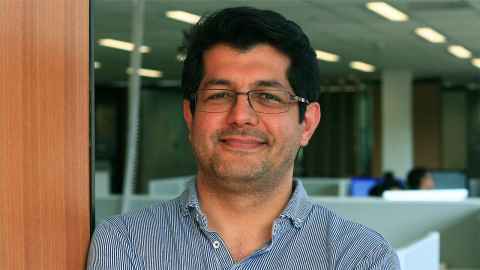Take 10 with... Ghader Bashiri
Dr Ghader Bashiri, Sir Charles Hercus Fellow in the School of Biological Sciences, gives us 10 minutes of his time to discuss his research into the global issues of antimicrobial resistance and methane emissions.

1. Describe your research topic to us in 10 words or less.
Understanding complex biological systems at a molecular level.
2. Now explain it in everyday terms!
Broadly speaking, my academic interests lie in the microbial world. The overarching research themes in my laboratory are to address the global issues of antimicrobial resistance and methane emissions. These challenges are of major worldwide importance, and require multidisciplinary approaches. Our research blends structural and molecular biology with genetics and biological chemistry, and we engage in many strategic external collaborations.
Antimicrobial resistance is one of the most pressing public health concerns of modern times. By 2050, it is estimated that 10 million people worldwide will be at risk of dying every year from drug-resistant infections. In addition, methane production by rumen-dwelling microorganisms is the largest source of methane emission from livestock, corresponding to almost one-third of greenhouse gas emissions in New Zealand. We aim to obtain a fundamental understanding of these systems at a molecular level, and apply this knowledge to come up with new sustainable solutions to overcome these issues.
3. Describe some of your day-to-day research activities.
I spend a lot of time in the office analysing data, or writing applications and manuscripts, but I really enjoy working in the laboratory whenever I get the chance. I have my own projects and run my own experiments, which means that on a typical day in the laboratory I would do anything from starting expression cultures in a bioreactor to running binding assays or setting up crystallisation experiments. I also spend time with my postgraduate students and research staff, discussing experimental design or data analysis. My commute time on the train usually involves reading about the new research published in my fields of interest.
4. What do you enjoy most about your research?
The beauty of research is that you have new problems to solve on a daily basis, which also means that you get to learn something new every day. The most exciting part of research for me is the experimental confirmation of some fundamental questions after years of designing experiments and laboratory work.
5. Tell us something that has surprised or amused you in the course of your research.
I always remember a saying from my mentor, Emeritus Professor Ted Baker, “look out for unexpected findings because they can transform your science”. This is something that happens over and over within a research setting. For example, my research on what was previously seen as a rather obscure biochemical compound has now led to a successful funding application in the agritech space, by applying what we learnt from a human pathogen to the microorganisms that produce methane in livestock. It is amazing to see how influential fundamental research can be, and the wide range of applications you might achieve.
6. How have you approached any challenges you’ve faced in your research?
Challenges in research come in different shapes and forms, whether it be troubleshooting an experiment or dealing with various setbacks you might face in your academic career. What I find most helpful is having a trusted network of friends and colleagues who are happy to listen and offer suggestions/solutions. We, as researchers, have to be persevering creatures as so many experiments fail. As Louis Pasteur once put it, strength lies solely in tenacity.
7. What questions have emerged as a result?
The nature of research is such that every result leads to a wide range of new questions. The challenge is to determine which direction to take without deviating too far from the original question, while seizing the opportunity to build new research ideas.
8. What kind of impact do you hope your research will have?
We hope to use the knowledge gained from our research to develop novel and improved strategies for human health and climate outcomes. As for any other journey, this is a long and winding road, and we do our best to make the most of the scenery along the way.
9. When collaborating across the faculty or University, or even outside the University, who do you work with and how does it benefit your research?
Given the broad research questions that we are trying to answer, the majority of our research is multidisciplinary and we cannot do everything ourselves. This, in turn, means that we collaborate with some great researchers, both locally and internationally. I collaborate with researchers across New Zealand, and also in Australia, Asia, Europe, and USA. The synergy created through these collaborations are extraordinary, providing us with the complementary approaches and perspectives that each individual or research group brings in and sometimes leading us into new directions.
10. What one piece of advice would you give your younger, less experienced research self?
Think about the big picture and step out of your comfort zone, figure out what success means and find people who will help you get there, work hard and believe that perseverance will pay off in the end. Finally, be kind to yourself.